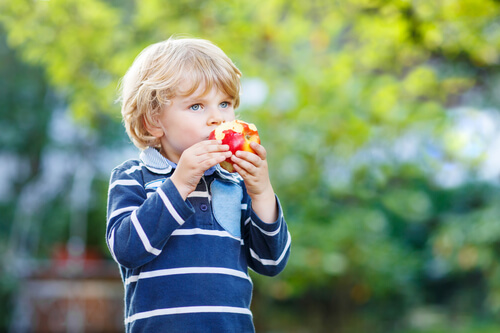The Importance of Eating Healthy from a Young Age

New programs appear every day to provide better education to parents on all sorts of child-raising issues, including nutrition.
Both in the family nucleus as well as in educational institutions, nutrition has become a central concept. In fact, some schools even make it part of their education program. This is because they consider a balanced diet to be fundamental in the development of children.
Eating healthy from a young age means consuming good quality foods. It means avoiding sugars and saturated fats as much as possible.
As a result, children will be more adept to choosing nutritious foods, and more prone to rejecting junk food.
Of course, we’re not saying this is an easy task to accomplish. Obstacles will always come up. And, of course, this brings up a lot of questions for parents.
The first doubt that appears among parents is why some children eat more than others. The answer is that little ones are used to the sweet and relatively unchanging flavor of milk.
When they begin their complementary diet, they encounter new and unfamiliar flavors that stand out from what they are used to.

How to set a good example of healthy eating for our children
When teaching our children about nutrition, as with any other lesson in child-raising, we must practice what we preach. We can’t expect our children to do anything we are not willing to do ourselves.
Remember that the first step towards a healthy diet for children starts when they are babies. This means we need to set a good example with our own nutrition.
By setting an example with our own healthy decisions, we will be setting a good foundation for our children.
Healthy eating habits start by having a wide variety of food available in the home. This will help your growing child get used to lots of different flavors.
Specialists recommend sitting down to eat alongside your child and teach them about the types of food that are eaten at your home.
Recommendations for eating healthy from a young age
If your child refuses to eat all of the foods that you offer, don’t lose hope or get angry. With a bit of patience and tolerance, your child will be sure to adapt to new flavors, little by little.
Some parents employ the technique of letting their children try a bit of whatever the family is eating. In a way, this speeds up the learning process.
For example, if you are chopping foods like carrots or ham, you can offer small amounts to your child without forcing him or her to eat them.
Another trick is to use different colors in the food. For example, you can prepare white sauces made with potatoes, cauliflower or onion. You can also prepare orange colored creams using carrots or squash.
“It’s important to respect the introduction of new foods from all the food groups, according to the rhythm established by your child’s pediatritian”
Another tactic involves allowing the children to touch and manipulate foods themselves. This lets children get used to foods and become familiar with them.
You can also arrange the plate in a way that is more attractive and eye-catching.
Remember, your child should only have access to sweets every once in a while. The reason behind this is simple.
If you don’t control your child’s intake of sweets, there will come a time when dessert will become more important for your child than the meal itself. And as a result, your child will come to dislike whatever comes before dessert.

More tips for teaching children healthy eating
If you teach your children to eat right at an early age by providing a healthy balanced diet, you are setting them up for a lifetime of good health.
One important piece of advice is to allow your child to stop eating once he or she feels full.
Within certain limits, small children will always eat until they are satisfied. We should let them be the ones to indicate when that is.
It’s true that likes and dislikes start to form during lactation. Just the same, if your child rejects certain flavors, that doesn’t mean he or she will never come to like them.
Sometimes it’s just a question of trying again. If your child doesn’t like a food the first time around, wait a few days and offer it to him again. At some time or another, your child will likely give it a try.
New programs appear every day to provide better education to parents on all sorts of child-raising issues, including nutrition.
Both in the family nucleus as well as in educational institutions, nutrition has become a central concept. In fact, some schools even make it part of their education program. This is because they consider a balanced diet to be fundamental in the development of children.
Eating healthy from a young age means consuming good quality foods. It means avoiding sugars and saturated fats as much as possible.
As a result, children will be more adept to choosing nutritious foods, and more prone to rejecting junk food.
Of course, we’re not saying this is an easy task to accomplish. Obstacles will always come up. And, of course, this brings up a lot of questions for parents.
The first doubt that appears among parents is why some children eat more than others. The answer is that little ones are used to the sweet and relatively unchanging flavor of milk.
When they begin their complementary diet, they encounter new and unfamiliar flavors that stand out from what they are used to.

How to set a good example of healthy eating for our children
When teaching our children about nutrition, as with any other lesson in child-raising, we must practice what we preach. We can’t expect our children to do anything we are not willing to do ourselves.
Remember that the first step towards a healthy diet for children starts when they are babies. This means we need to set a good example with our own nutrition.
By setting an example with our own healthy decisions, we will be setting a good foundation for our children.
Healthy eating habits start by having a wide variety of food available in the home. This will help your growing child get used to lots of different flavors.
Specialists recommend sitting down to eat alongside your child and teach them about the types of food that are eaten at your home.
Recommendations for eating healthy from a young age
If your child refuses to eat all of the foods that you offer, don’t lose hope or get angry. With a bit of patience and tolerance, your child will be sure to adapt to new flavors, little by little.
Some parents employ the technique of letting their children try a bit of whatever the family is eating. In a way, this speeds up the learning process.
For example, if you are chopping foods like carrots or ham, you can offer small amounts to your child without forcing him or her to eat them.
Another trick is to use different colors in the food. For example, you can prepare white sauces made with potatoes, cauliflower or onion. You can also prepare orange colored creams using carrots or squash.
“It’s important to respect the introduction of new foods from all the food groups, according to the rhythm established by your child’s pediatritian”
Another tactic involves allowing the children to touch and manipulate foods themselves. This lets children get used to foods and become familiar with them.
You can also arrange the plate in a way that is more attractive and eye-catching.
Remember, your child should only have access to sweets every once in a while. The reason behind this is simple.
If you don’t control your child’s intake of sweets, there will come a time when dessert will become more important for your child than the meal itself. And as a result, your child will come to dislike whatever comes before dessert.

More tips for teaching children healthy eating
If you teach your children to eat right at an early age by providing a healthy balanced diet, you are setting them up for a lifetime of good health.
One important piece of advice is to allow your child to stop eating once he or she feels full.
Within certain limits, small children will always eat until they are satisfied. We should let them be the ones to indicate when that is.
It’s true that likes and dislikes start to form during lactation. Just the same, if your child rejects certain flavors, that doesn’t mean he or she will never come to like them.
Sometimes it’s just a question of trying again. If your child doesn’t like a food the first time around, wait a few days and offer it to him again. At some time or another, your child will likely give it a try.
All cited sources were thoroughly reviewed by our team to ensure their quality, reliability, currency, and validity. The bibliography of this article was considered reliable and of academic or scientific accuracy.
- Peña, L; Ros, L; González, D; Rial, R. Alimentación del preescolar y escolar. Protocolos diagnóstico-terapéuticos de Gastroenterología, Hepatología y Nutrición Pediátrica. SEGHNP- AEP. [En línea] Disponible en: https://www.aeped.es/sites/default/files/documentos/alimentacion_escolar.pdf
- Alimentación y desarrollo del niño y niña de 0 a 24 meses de vida. Secretaría Nacional para el Plan Alimentario Nutricional. UNICEF. [En línea] Disponible en: https://www.unicef.org/panama/spanish/guia_salud_2009.pdf
- Córdova, M. La teoría y la práctica de los hábitos saludables. Mejor con salud. [En línea] Disponible en: https://mejorconsalud.as.com/teoria-practica-los-habitos-saludables/
This text is provided for informational purposes only and does not replace consultation with a professional. If in doubt, consult your specialist.








